-
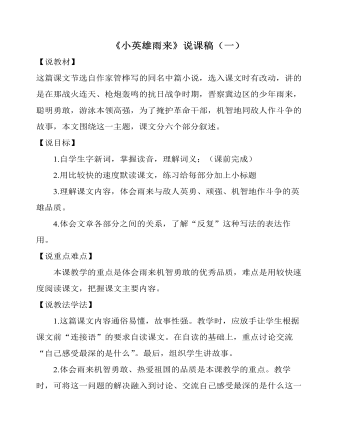
部编人教版四年级下册《小英雄雨来》说课稿(一)
【说教材】这篇课文节选自作家管桦写的同名中篇小说,选入课文时有改动,讲的是在那战火连天、枪炮轰鸣的抗日战争时期,晋察冀边区的少年雨来,聪明勇敢,游泳本领高强,为了掩护革命干部,机智地同敌人作斗争的故事,本文围绕这一主题,课文分六个部分叙述。【说目标】1.自学生字新词,掌握读音,理解词义;(课前完成)2.用比较快的速度默读课文,练习给每部分加上小标题3.理解课文内容,体会雨来与敌人英勇、顽强、机智地作斗争的英雄品质。
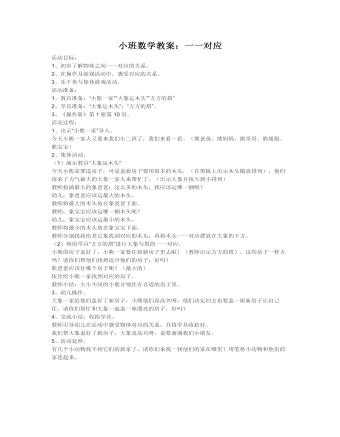
小班数学教案:一一对应
2、在操作及游戏活动中,感受对应的关系。 3、乐于参与集体游戏活动。 活动准备: 1、教具准备:“小熊一家”“大象运木头”“方方的搭” 2、学具准备:“大象运木头”;“方方的塔”。 3、《操作册》第1册第10页。 活动过程: 1、出示“小熊一家”导入。 今天小熊一家人又要来我们小二班了,我们来看一看。(熊爸爸、熊妈妈、熊哥哥、熊姐姐、熊宝宝)
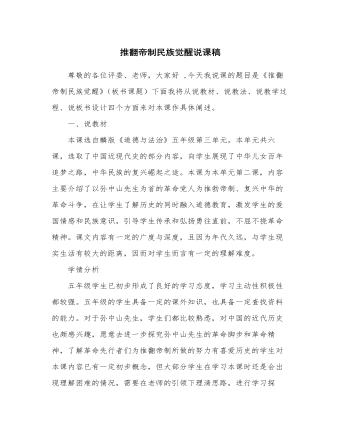
人教部编版道德与法制五年级下册新版推翻帝制民族觉醒说课稿
2、班级交流请小组派代表在班级交流,说说在小组学习中的收获和体会。3、教师总结:孙中山先生一生都在为推翻帝制,推进民主革命,实现中华民族的伟大复兴而努力,他是一位伟大的革命先驱,值待我们每个人的尊敬与怀念。活动三:感受孙中山的革命精神(一)学习名言1、出示孙中山先生的名言,指名学生朗读。2、请学生来说说名言的含义。3、老师帮助解读,引导学生体悟孙中山先生的革命精神。4、请学生结合孙中山先生的伟大精神,说说对自己的学习生活的启示。5、齐读名言。(二)学习链接资料1、出示课文中链接资料,学生默读资料。2、讨论:说说我们国家目前的巨大变化,畅想祖国的美好未来。3、教师小结今日中华民族的伟大复兴与革命先辈们的不断探求救国救民之路,奋勇抗争推翻帝制是分不开的,让我们牢记历史,以孙中山等革命先驱为榜样,为祖国的美好未来努力奋斗!
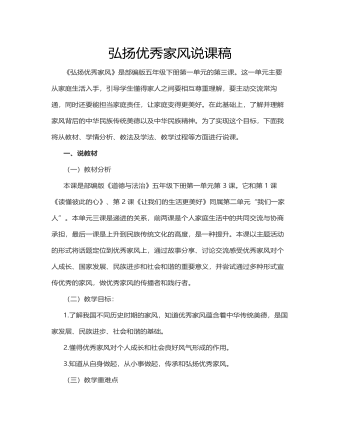
人教部编版道德与法制五年级下册新版弘扬优秀家风说课稿
3.3百年革命家国情怀同学们,我们今天的美好生活,是许多烈士用鲜血换来的。书中摘录了一些仁人志士写给家人的书信。我们一起来读一读,边读边思考,你从中体会到了哪些优秀家风?热爱祖国,报效祖国。教师小结:在培育良好家风方面,先辈们为我们做出了榜样,让我们学习先辈,传承良好家风。4.活动园对长辈做一次访谈,了解家风,并在班中交流分享。(三)教师总结:家庭就像社会中的细胞,每一个小家的幸福共同构建起一个和谐的社会。每一个家庭的优秀家风,汇聚成中华民族的家风。无论时代如何变化,优秀家风都是国家发展、民族进步与社会和谐的基础。作业写作一篇《我的家风故事》,下节课分享讨论。五、说教学设计弘扬优秀家风优秀家风对个人成长、国家发展、民族进步和社会和谐的重要意义
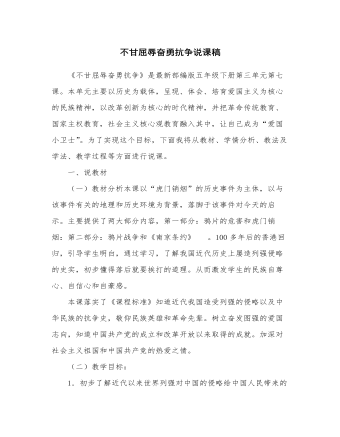
人教部编版道德与法制五年级下册新版不甘屈辱奋勇抗争说课稿
1、同学们,老师这里收到了一位法国大作家雨果的来信,让我一起来听一听。“在世界的一隅,存在着人类的一大奇迹,这个奇迹就是圆明园。圆明园属于幻想艺术。一个近乎超人的民族所能幻想到的一切都荟集于圆明园。只要想象出一种无法描绘的建筑物,一种如同月宫似的仙境,那就是圆明园。假定有一座集人类想象力之大成的宝岛,以宫殿庙宇的形象出现,那就是圆明园。”2、听了雨果的这段话,你脑海中的圆明园是怎么样的?有什么疑问吗?3、但是,这一奇迹现在已荡然无存,留在我们眼前的只有几根残缺的大石柱。它们静静地站在那里,像一座纪念碑,诉说那段屈辱的历史—板书:圆明园的诉说。二、学习新课,体验明理活动一:惊叹圆明园的辉煌师:圆明园是一座皇家园林,现在却只留下这些残垣断壁。那么,你知道圆明园在哪儿吗?你知道多少关于圆明园的故事?

新人教版高中英语必修3Unit 5 The Value of Money- Discovering Useful Structure教学设计
Step 3 Meaning1. 过去将来时表示从过去某一时间来看将要发生的动作或存在的状态, 常用在宾语从句中。一般由“would/should +动词原形”构成。She hoped that they would meet again someday. 她希望将来有一天他们能再见面。2. was/were going to+动词原形: 表示过去将要发生或很有可能发生的动作, 常用于口语中, 表示预言、意图或者打算等。He was going to start work the following week. 他打算下星期开始工作。3. was/were about to do: 常用来表示即将发生的动作, “刚要/正要做……”。注意该结构不与任何时间状语连用。I felt that something terrible was about to happen. 我感到某种可怕的事情即将发生。4.was/were to do: 表示“曾计划做某事”, 如果表示“本来计划做某事, 动作没实现”, 则需用 “was/were to have done”。She said she was to have told me about the accident. 她说她本来想告诉我关于事故的事。5.Start, go, come, leave, see, meet等动词的过去进行时: 表示就过去某一时刻而言即将发生的动作。She was coming later. 她随后就来。I had just put on my overcoat and was leaving to visit a friend of mine. 我刚穿上外套要去看我的一个朋友。

新人教版高中英语必修3Unit 5 The Value of Money-Listening &Speaking教学设计
Step 4: Listen again and decide if the following statements are true (T) or false (F).1 It was the first time Chen Liyan's story was reported. T口 F口2 Chen found 10,000 yuan in a small plastic bag in Taiyuan railway station口 F口3 Wang Zheng apologized to Chen because he couldn't offer her more money. T口 F口4 Chen took out a large loan to cure her daughter, T口 F口5 Wang set up a fundraising website for Chen's daughter after Chen told him about her situation. T口 F口Step 5:After listening, discuss the questions.1 What kind of person do you think Chen Liyan is?Chen Liyan is generous and honest because she returned a large sum of money to the owner.2 Did Chen return the money because she didn't need it?No. She returned the money because it was the right thing to do. Evidence for this is that she refused to accept the reward money because she felt that it had not been earned. 3 Is it common for people to do what Chen did?It depends on the culture. In some countries it is quite common to return money that has been found. In other countries, people believe "Finders are keepers!" 4 How did Wang Zheng feel about the return of his money?He must have been very happy and relieved to have gotten his money back. We know this because he thanked Chen repeatedly and even offered her a reward.5 Why did Ma Dongbao tell Wang about Chen's family?He must have had great sympathy for Chen and her daughter and wanted to help them.'We know this because he arranged help for them. 6 How did the news reporter feel about Chen's actions?The news reporter felt that it showed that money wasn't the most important thing in life. We know this because the reporter told us that this is what Chen believes. and then said, “that's a great attitude to take."

新人教版高中英语必修3Unit 5 The Value of Money-Reading for Writing教学设计二
2. 您能看到, 我头发太长了。You can see that my hair is much too long.3. 无论什么时候, 只要您想回来就回来。Please come back whenever you want.4. 您仅有很少的头发要理! You only have too little hair to cut !5. 为您服务是我的荣幸!It is my honour to serve you!Step 9 Writing(Henry is walking down the street when he sees a sign for a place that cuts hair. He decides to have it cut. )H=Henry B=BarberH: Good afternoon, I’d like to have my hair cut, if I may. (The barber looks at Henry’s hair and continues cutting another man’s hair. ) Er, I’d really like a haircut. As you can see it’s much too long. B: (in a rude manner) Yes, I can see that. Indeed, I can. H: Fine, well, I’ll have a seat then. (He sits in one of the barber’s chairs. The barber turns to look at Henry. )B: It’s quite expensive here, you know! Are you sure you can afford it?H: Yes. I think so. (After his hair is cut, the barber tells Henry how much he must pay. Henry shows the barber the bank note. )B: Why Mr. . . (looks shocked)H: Adams. Henry Adams. I’m sorry. I don’t have any change. B: Please don’t worry! (wearing a big smile) Nothing to worry about! Nothing at all! Please come back whenever you want, even if you only have too little hair to cut! It will be my honour to serve you!Step 10 Pair workExchange drafts with a partner. Use this checklist to help your partner revise his/her draft.1. Are all the elements of a play included and in good order ?2. Do the character use suitable language ?3. Are the stage directions clear and useful ?4. Is the plot clear and exciting enough ?

新人教版高中英语必修3Unit 5 The Value of Money-Listening &Speaking&Talking教学设计
4. A:We’d like to have someone to say a word at the beginning to welcome the group.B:↙Who?A:We thought that you or Dr.Johnson might do it.B用降调说Who,其意思是问,对方想让谁在开场时致欢迎词。Step 6 Pronunciation---Practice1. Listen to the short conversation and mark the intonation with ↗, ↙ or ↙, ↗. Then discuss with a partner what they intend to convey by using different intonation.Owner: You know what ?↗ It’s a million-pound bank note↙.Waiter 1: Really ?↗(question)Waiter 2: Really !↙(unbelievable and surprised)Waiter 3: Really ?!↙↗(first question then surprised)2. Listen to the conversations. Underline the parts that are stressed and mark the intonation. Then talk about the implied meanings of the responses with different intonations. Listen again and repeat.1) Henry: It’s a nice suit.Owner: Oh, it’s perfect!↙(The intonation means it is very suitable for Henry.)2) Henry: Well, that’s very kind of you.Owner: Kind, sir ?↗(what you said is not right) No, it’s kind of you. You must come whenever you want and have whatever you like. Just having you sit here is a great honour !!↙(welcome you to come again)3)Henry:Well, to be honest, I have none. Oliver:(happily) What luck!(excited) Brother↗, what luck!↙(It means “Didn’t you hear it?”)Henry: Well, it may seem lucky to you but not to me!↗(angry) If this is your idea of some kind of joke, I don’t think it’s very funny. Now if you’ll excuse me, I ought to be on my way.↙(If so, I would leave.)Roderick: Please don’t go↙...(hope Henry can wait for a moment)Part B Viewing and Talking---Describe people’s changing attitudes in a film clipStep 1 Before-listening---Tell the filmYou are going to watch part of the film The Million Pound Bank Note. Look at these photos and guess what happens in the film.

新人教版高中英语必修3Unit 5 The value of money-Reading and Thinking教学设计二
? Could you offer me some kind of work here?? I don’t want your charity, I just want an honest job.? Careless: I landed in Britain by accident.Step 7:Consolidation.? Find Henry? Roderick and Oliver were I .making a bet when they saw Henry, a poor young man. ? Know Henry? About a month ago, Henry was sailing and later he found himself carried out to sea by a strong wind. Fortunately, he 2.was spotted by a ship. And it was the ship that brought him to 3.England? Offer money to Henry ? Oliver and Roderick gave Henry a letter and told him that there was money in it. They 4.persuaded him to accept it, and made him 5.promise that it wouldn't be opened until 2 o'clock.Step 8:Language pointsa large amount of: a large quantity of; a great deal ofe.g. They bought a large amount of furniture before they moved their new house.make a bet: make an arrangement to risk money, etc. on an event of which the result is doubtful.e.g. We made a bet on the result of the match.permit sb to do something: allow somebody to do somethinge.g. My mother doesn’t permit me to ride in the street after it rained.by accident: as a result of chancee.g. I only found it by accident.stare at: look at somebody or something with the eyes wide open in a fixed gaze( in astonishment, wonder, fear, etc)to be honest: to tell you the truth; to be franke.g. To be honest, I don’t think we have a chance of winning.Step7 Homework:What do you think will happen to Henry? Will the bank-note help him or get him into trouble?

新人教版高中英语选修2Unit 5 First Aid-Discovering useful structures教学设计
You have no excuse for not going.你没有理由不去。He was punished for not having finished his homework.他因未完成作业而受到惩罚。2.动词ing形式复合结构由物主代词或人称代词宾格、名词所有格或普通格加动词ing,即“sb./sb.'s+doing”构成。动词ing形式的复合结构实际上是给动词ing形式加了一个逻辑主语。动词ing形式的复合结构有四种形式:①形容词性物主代词+动词ing②名词所有格+动词ing③代词宾格+动词ing④名词+动词ingHer coming to help encouraged all of us.她来帮忙鼓舞了我们所有人。The baby was made awake by the door suddenly shutting.这个婴儿被突然的关门声吵醒了。Can you imagine him/Jack cooking at home?你能想象他/杰克在家做饭的样子吗?无生命名词无论是作主语还是作宾语都不能用第②种形式。Tom's winning first prize last year impressed me a lot.汤姆去年得了一等奖使我印象深刻。Do you mind my/me/Jack's/Jack leaving now?你介意我/杰克现在离开吗?Excuse me for my not coming on time.很抱歉我没能按时来。His father's being ill made him worried.他父亲病了,他很担心。We are looking forward to the singer's/the singer to give us a concert.我们盼望着这位歌手来给我们举办一场演唱会。
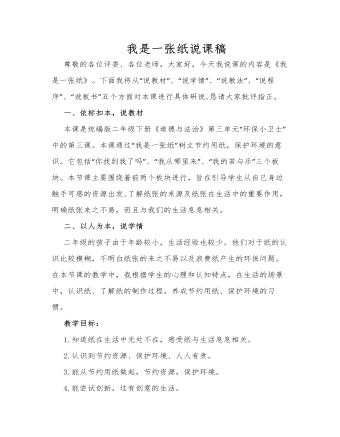
人教部编版道德与法制二年级下册我是一张纸说课稿
一、依标扣本,说教材本课是统编版二年级下册《道德与法治》第三单元“环保小卫士”中的第三课。本课通过“我是一张纸”树立节约用纸,保护环境的意识。它包括“你找到我了吗”、“我从哪里来”、“我的苦与乐”三个板块。本节课主要围绕着前两个板块进行,旨在引导学生从自己身边触手可感的资源出发,了解纸张的来源及纸张在生活中的重要作用,明确纸张来之不易,而且与我们的生活息息相关。二、以人为本,说学情二年级的孩子由于年龄较小,生活经验也较少。他们对于纸的认识比较模糊,不明白纸张的来之不易以及浪费纸产生的环保问题。在本节课的教学中,我根据学生的心理和认知特点,在生活的场景中,认识纸、了解纸的制作过程,养成节约用纸、保护环境的习惯。教学目标:1.知道纸在生活中无处不在,感受纸与生活息息相关。2.认识到节约资源、保护环境、人人有责。3.能从节约用纸做起,节约资源,保护环境。4.能尝试创新,过有创意的生活。
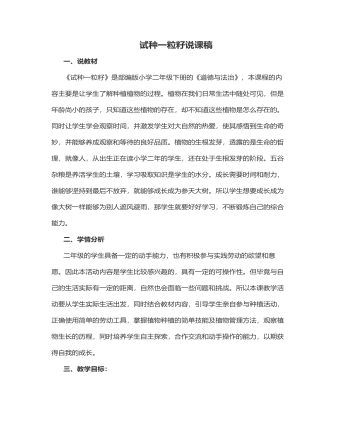
人教部编版道德与法制二年级下册试种一粒籽说课稿
【设计意图:引导学生写种植计划,锻炼动脑动手能力。】(4)、我们的收获1.师:一周过去了,你们种的种子怎么样了?一定有很多体会吧?下面让我们一起来分享一下自己的种植故事。2.生l:这是我种的土豆的照片。瞧,土豆苗多可爱啊!生2:爷爷说不能天天浇水,也不能心急。生3:花生苗的力量真大呀,能把好大的土疙瘩顶起来!生4:我自己种的蒜苗都舍不得吃。3.(课件出示教材第l7页“我的种植日记”)师:你们从中发现了什么问题?4.生:日记中的主人翁因看到种了3天的葵花子还没发芽而心急。5.(课件出示教材第17页《植物成长记录图》)师:你们从中发现了什么?6.学生讨论交流。7.师:的确,我们在观察植物生长的过程中不能心急,要认识到一粒种子的生长过程和我们的生长过程一样,需要经过耐心地等待,才会发芽、成长。【设计意图:让学生体会到种子发芽的过程是一个耐心等待的过程,从而明白要细心地呵护每一个小生命。】
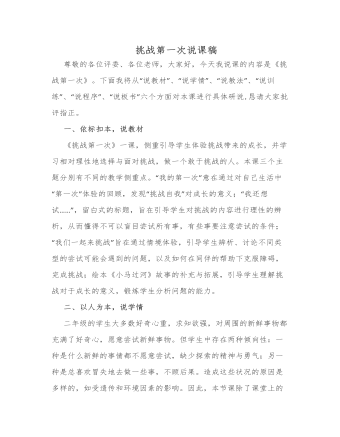
人教部编版道德与法制二年级下册挑战第一次说课稿
我是快乐的挑战者,我试试,我能行!遇困难,我不怕!来挑战,会选择!我挑战,我成功!出示任务:全班挑战诵读儿歌。反馈指导:1.学生一人挑战诵读儿歌。2.全班同学挑战打着节拍诵读儿歌。3.赠送秘籍:信心、勇气、智慧。(张贴)活动四:计划书写,情感升华导语:那么现在请大家带着这份秘籍,写下你下一个想尝试的事情吧!出示任务:学生写下还想尝试的事情,并指定一两名学生说出自己的挑战内容。反馈指导:1.写出自己想尝试的事情。2.汇报分享自己想尝试的事情。小结:同学们,面对挑战,我们需要一点信心,需要一点勇气,还需要一点智慧,那么,请带着智慧、勇气、信心,完成你们的下一次挑战吧!预祝大家挑战成功!六、浓缩文本,说板书根据二年级的年龄特点,本课板书以图画的形式呈现,能吸引学生的注意力,内容简单明了,重难点突出。
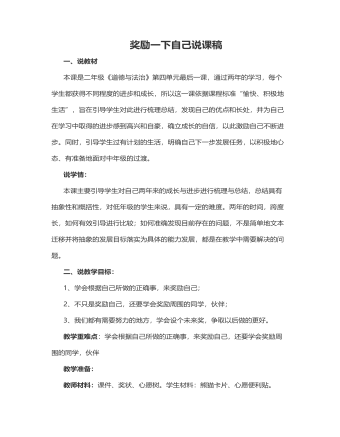
人教部编版道德与法制二年级下册奖励一下自己说课稿
(三)、小小心愿树1.师:看到同学们取得了这么多的成长和进步,冉老师也想给自己发个奖。以前,老师的字写得不够漂亮,为了鼓励自己,老师给自己发了一个“未来书法家”的奖状。(出示PPT)可是如果要成为书法家,老师还得继续努力,多多练习,才能实现自己的愿望。2.师:像老师一样,即将升入三年级的小熊猫也给自己提出了新的目标。(播放PPT)3.同学们,现在让我们像小熊一样,把自己的心愿和目标写下来,贴到黑板上的心愿树上来时刻鼓励自己。现在请同学们把老师给你们准备的便利贴拿出来,首先写上姓名,然后再把自己在三年级想要达成的心愿写下来,可以是生活上中的、学习上的、也可以是兴趣爱好上的。现在开始动笔写吧!(播放音乐)生:(将愿望贴到心愿树上)[设计意图:通过“小小心愿树”的活动,让学生为自己提出新目标,并引导学生知道要实现新目标,必须得坚持不懈的努力才行。]
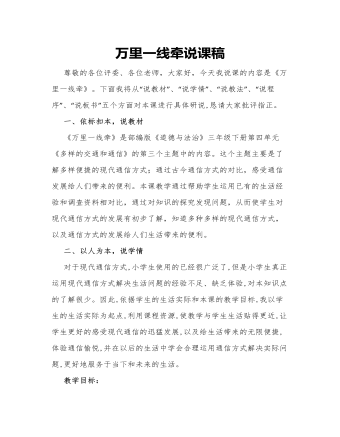
人教部编版道德与法制三年级下册万里一线牵说课稿
一、依标扣本,说教材《万里一线牵》是部编版《道德与法治》三年级下册第四单元《多样的交通和通信》的第三个主题中的内容。这个主题主要是了解多样便捷的现代通信方式;通过古今通信方式的对比,感受通信发展给人们带来的便利。本课教学通过帮助学生运用已有的生活经验和调查资料相对比,通过对知识的探究发现问题,从而使学生对现代通信方式的发展有初步了解,知道多种多样的现代通信方式,以及通信方式的发展给人们生活带来的便利。二、以人为本,说学情对于现代通信方式,小学生使用的已经很广泛了,但是小学生真正运用现代通信方式解决生活问题的经验不足、缺乏体验,对本知识点的了解很少。因此,依据学生的生活实际和本课的教学目标,我以学生的生活实际为起点,利用课程资源,使教学与学生生活贴得更近,让学生更好的感受现代通信的迅猛发展,以及给生活带来的无限便捷,体验通信愉悦,并在以后的生活中学会合理运用通信方式解决实际问题,更好地服务于当下和未来的生活。
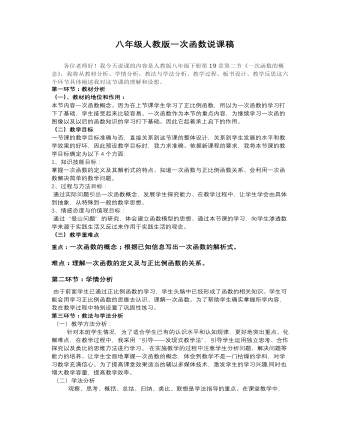
八年级人教版一次函数说课稿
1、知识技能目标:掌握一次函数的定义及其解析式的特点、知道一次函数与正比例函数关系、会利用一次函数解决简单的数学问题。2、过程与方法目标: 通过实际问题引出一次函数概念,发展学生探究能力、在教学过程中,让学生学会由具体到抽象,从特殊到一般的数学思想。 3、情感态度与价值观目标: 通过“登山问题”的研究,体会建立函数模型的思想、通过本节课的学习,向学生渗透数学来源于实践生活又反过来作用于实践生活的观念。
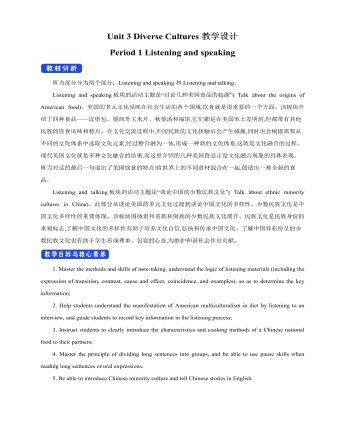
新人教版高中英语必修3Unit 3 Diverse Cultures教学设计一
Activity 81.Grasp the main idea of the listening.Listen to the tape and answer the following questions:Who are the two speakers in the listening? What is their relationship?What is the main idea of the first part of the listening? How about the second part?2.Complete the passage.Ask the students to quickly review the summaries of the two listening materials in activity 2. Then play the recording for the second time.Ask them to complete the passage and fill in the blanks.3.Play the recording again and ask the students to use the structure diagram to comb the information structure in the listening.(While listening, take notes. Capture key information quickly and accurately.)Step 8 Talking Activity 91.Focus on the listening text.Listen to the students and listen to the tape. Let them understand the attitudes of Wu Yue and Justin in the conversation.How does Wu Yue feel about Chinese minority cultures?What does Justin think of the Miao and Dong cultures?How do you know that?2.learn functional items that express concerns.Ask students to focus on the expressions listed in activity. 3.And try to analyze the meaning they convey, including praise (Super!).Agree (Exactly!)"(You're kidding.!)Tell me more about it. Tell me more about it.For example, "Yeah Sure." "Definitely!" "Certainly!" "No kidding!" "No wonder!" and so on.4.Ask the students to have conversations in small groups, acting as Jsim and his friends.Justin shares his travels in Guizhou with friends and his thoughts;Justin's friends should give appropriate feedback, express their interest in relevant information, and ask for information when necessary.In order to enrich the dialogue, teachers can expand and supplement the introduction of Miao, dong, Lusheng and Dong Dage.After the group practice, the teacher can choose several groups of students to show, and let the rest of the students listen carefully, after listening to the best performance of the group, and give at least two reasons.
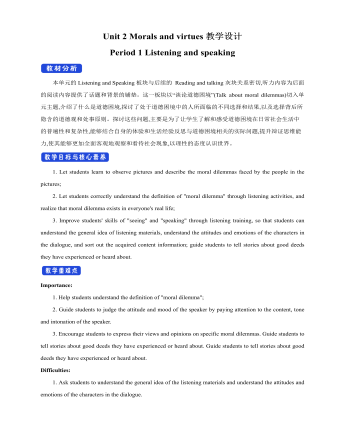
新人教版高中英语必修3Unit 2 Morals and virtues教学设计一
(2) students are divided into groups according to the requirements of activity 3. Each student shares a story of personal experience or hearing-witnessing kindness, and then selects the most touching story in the group and shares it with the whole class. Before the students share the story, the teacher can instruct them to use the words and sentence patterns in the box to express. For example, the words in the box can be classified:Time order: first of all, then, after that, later, finally logical relationship :so, however, although, butTeachers can also appropriately add some transitional language to enrich students' expression:Afterwards, afterwards, at last, in the end, eventuallySpatial order: next to, far from, on the left, in front ofOtherwise, nevertheless, as a result, therefore, furthermore, in addition, as well asSummary: in a word, in short, on the whole, to sum up, in briefStep 8 Homework1. Understand the definition of "moral dilemma" and establish a correct moral view;2. Accumulate vocabulary about attitudes and emotions in listening texts and use them to express your own views;3. Complete relevant exercises in the guide plan.1、通过本节内容学习,学生能否理解理解“道德困境”的定义;2、通过本节内容学习,学生能否通过说话人所表达的内容、说话的语气、语调等来判断其态度和情绪;3、通过本节内容学习,学生能否针对具体的道德困境发表自己的看法和见解,能否掌握听力理训练中的听力策略。
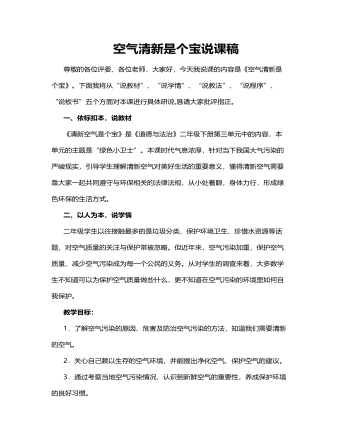
人教部编版道德与法制二年级下册空气清新是个宝说课稿
任务1:同学们,你们在课前调查中发现了哪些污染空气的现象?请将调查结果填写在《空气污染小调查》的表格中。学生活动:学生在全班汇报展示。任务2:从调查结果中我们还发现什么呢?学生活动:学生交流。教师小结:空气污染就在我们身边,大气污染带给我们一定的危害,我们一定要养成保护环境的好习惯。活动四:我能做些什么呢任务1:为防治大气污染,国家、政府做了大量工作,我们也做了很多力所能及的事情。那么,同学们计划怎样保护空气清新呢?学生活动:学生交流(如植树造林、使用新能源产品等、不放鞭炮、敢于举报严重污染大气的行为……)。教师小结:通过本节课的学习,我们知道了保护环境就是保护我们的家园,净化空气就要从身边的小事做起。

